- Home
- S. Hussain Zaidi
The Endgame Page 2
The Endgame Read online
Page 2
The latter, after a moment’s silence, stood up and hugged Mankame.
Both Vikrant and Mankame had been DCPs during the Lakshadweep operation. While Vikrant, who was a batch senior to Mankame, had already been promoted to DIG, Mankame was up for promotion soon. Then with the Mumbai Crime Branch, Mankame was now posted with the ATS and, from what Vikrant had heard, doing a fine job of it.
Mirza, too, stood up and offered his hand. Mankame held on to it for a second.
‘Sorry for your loss, sir. I heard you were close to Kumar sir,’ he said.
Mirza and Vikrant exchanged looks. The fact that Mankame already had his ear to the ground was not lost on either of them.
‘What do we have?’ Mirza asked as they sat down at a table.
‘Eyewitness accounts, CCTV footage analysis reports, the works,’ Mankame said, opening the thick folder he was carrying. ‘I picked them up on my way. Teams are still at the attack site.’
‘Let’s start, then,’ Mirza said, and the three cops got to work.
Over the next two hours, they established a rough sequence of events, based on whatever they knew so far. The four men had come to Grishma society four days before the attack. The society had recently hired a private contractor to repair the crumbling boundary wall of the compound and the four men had posed as labourers.
The NIA team that had inspected the site found dozens of sacks filled with cement, in which the guns – AK-56 assault rifles – as well as extra ammunition were believed to have been smuggled. The team reasoned that four of the sacks would have held the guns, while the rest of them would have concealed fully loaded clips. The labourers would work on the compound wall through the day and sleep in the compound at night, using the spare bathroom and toilet meant for security guards. The security guards said that the four attackers mostly kept to themselves and worked fast and quietly.
Another team grilled the contractor who had provided the men and the material, while a third team spoke to the secretary of the society who had hired the contractor.
The sequence of the attack itself was quite clear. As soon as the convoy turned onto K.C. Marg, the four men had removed the guns and opened fire. They took out the lead SUV – a Mumbai Police vehicle – and fired into the traffic in the opposite lane, causing cars to swerve everywhere, trapping the convoy in place.
The bomb was much more interesting. Forensic experts said that it was crudely made, put together using at least thirty gelatin sticks – used in mines and construction work for blasting and demolition – and armed with a remote detonator. It was aimed directly at Kumar’s SUV and whoever tossed it was aiming for the fuel tank so that the car would catch fire. It was as simple as it was effective.
‘But how did they know which SUV he was in?’ Mankame wondered aloud. ‘There were three of them and he chose to get into the third one at the last minute, as per the plan.’
‘Easy,’ Vikrant said. ‘Commandos from the other SUVs immediately stepped out and returned fire. His was the only vehicle that stayed shut.’
Mankame looked worried.
‘That means these men were smart. Brains, not just brawn,’ he said.
‘Or they had a very smart handler,’ Vikrant said.
‘Anything from the CCTV footage?’ Mirza asked.
‘We asked some experts to view it and they said that the way the men were moving suggests they had had some training, but not much. As in, they’re well versed in the use of a gun but don’t seem to have been in actual combat before.’
‘That’s right,’ Mumbai NIA Chief Sharma said, entering the suite. ‘I just got off the phone with ballistics experts who examined the bullet marks on our vehicles. The bullet spray suggests that were concentrating their fire on the BSF vehicles. The panic in the street, which held up a lot of reinforcements for a while, worked in their favour. But they weren’t aiming for any of our people. All their kills were sheer luck.’
‘They just needed to keep exchanging fire long enough to know which SUV Kumar sir was in,’ Vikrant said and everyone else nodded.
‘You thinking what I’m thinking, lad?’ Mirza asked.
Vikrant nodded.
‘Sleeper cell,’ he said. ‘This was a sleeper cell.’
3
Basuri bar was dimly lit and abuzz with those who had more than enough money but not enough ways to spend it.
Located on the Mira Road stretch of the Mumbai–Gujarat highway, Basuri was one of several ‘orchestra’ bars which were actually dance bars, operating despite the state government’s ban. The Bar Owners’ Association was still fighting a case in the Supreme Court, demanding that the blanket ban be lifted as it had snatched away the livelihood of hundreds of girls who had come from all over the country to earn money in these bars. The state government kept opposing it firmly, citing the criminal ecosystem that had come up around the dance bar industry.
At every hearing, the police would keep submitting lists of conditions that bar owners had to meet. The conditions, by design, were impossible to meet and the court would keep throwing them out. But the police were not worried, as long as it delayed the final hearing.
In the meantime, dance bar owners had made arrangements with the local police stations and Crime Branch units, and every part of the city had its own clandestine dance bar, operating behind soundproof and well-guarded doors. Areas on the outskirts, like the one where Basuri was located, had several in a row, complete with lodges upstairs and every kind of service available.
Darshan Seth was sitting at a semi-circular table in one corner of the bar, surrounded by four of his friends, all of whom were splurging hundred-rupee notes by the minute. The manager had realized that this group was flush with money and had quietly made it known to the staff that they were to be extended every courtesy possible, including a little credit if they needed it. Apart from his obvious affluence, Seth was also known to be associated with Dhanraj Shetty, one of the biggest and most dangerous drug dealers in the northern suburbs.
Two tables away, Chandu Khote sipped his second beer and waved a fifty-rupee note, attracting the attention of a dancing girl. She swayed over to him seductively and he let her get as close as she would before allowing her to touch the note. Then he winked at her. She giggled, took the note and danced away.
Khote finished his beer in one long gulp just as the bill, which he had already called for, came to his table. He settled it and left a hefty tip before walking out, a little unsteady on his legs.
His gait, however, changed completely as he turned the corner from the bar and got onto his motorbike. He liked to think he had a liver made of steel; it would take more than two bottles of mild beer to get him high.
He speedily rode towards Gujarat for a full ten minutes, keeping an eye on his rearview mirror for a tail, before pulling over to the side of the road. Then he fished out his cell phone and made a call.
‘Khabar pakka hai, sir. He’s in there blowing money like his father’s getting married. He must have got a hefty commission from that last deal,’ he said.
At the other end, Police Inspector Sushil Kadam acknowledged the information and ended the call.
A veteran of the force, Kadam was currently in charge of the Crime Branch Unit XII, which covered the area from eastern side of the Goregaon–Dahisar belt. Darshan Seth was a known facilitator and it was said that if Seth was negotiating for you, you would never get a raw deal. Everyone who was anyone knew that Shetty used Seth’s services to negotiate big drug deals and Kadam had been trying hard for months to get something to pin on Seth.
‘Was that Chandu, sir?’ one of his two constables asked from the back seat. Kadam liked to drive himself whenever he was leading an operation, and made the constables sit at the back, to their extreme embarrassment. They were in his own car instead of a police vehicle in order to avoid attracting attention.
Kadam nodded.
‘What do we do?’ the oth
er constable asked.
They were parked across the street a little distance ahead of the bar, sipping tea from a local tea vendor.
Before Kadam could answer, Seth and his four friends came staggering out. After a round of hugs and back slaps, they started weaving their way to their respective cars. Seth’s driver started the car as his boss got inside and placed himself heavily on the back seat.
Kadam, too, started his car.
Kadam followed Seth’s car for a good half an hour before he saw it slow down near a row of rundown shacks in Dahisar. He smiled. It was a known drug-peddling den. He killed the lights and waited.
Ten minutes later, Seth’s driver came out of the shack and got back into the car. Kadam turned the ignition, stepped on the accelerator and came to a screaming halt in the car’s path.
All three cops were out in a second. Kadam had his 9mm pistol pointed straight at the driver, while the two constables yelled at both men to stay still, peppering their commands with abuses. It was an intimidation tactic and, if played right, worked wonders. All three cops were aware that two men were slipping out of the back of the shack and running away. None of them cared. They were after bigger fish tonight.
The driver stepped out with his hands spread wide, one of the constables watching him like a hawk, while Kadam went over to the rear door and dragged a drunk and flustered Seth out.
‘Fancy a little fix, eh, Seth?’ Kadam said just as the constable frisking the driver came up with a small pouch filled with white powder. Kadam smiled.
Seth was driven to Unit XII in Kadam’s car, while his driver followed with Seth’s car, accompanied by one of the constables. Within half an hour, Seth was on the floor in the interrogation room, while the driver was being grilled in another room.
‘Get some rest, Seth,’ Kadam said. ‘We’ll talk in the morning about charging you with abetment. Your driver is going in on a possession charge for sure. If he doesn’t turn on you first.’
Without waiting for a response, Kadam left, bolting the door behind him. Then he pulled out his cell phone and speed-dialled a number.
Procedure required him to inform his superiors before making an arrest. The Crime Branch, due to the kind of crimes it tackled, was allowed to bend the rules a little, but a formal arrest would be a matter of record and his DCP would need to be consulted.
‘Bolo, Kadam,’ DCP Akhil Jaiswal said, answering the call on the third ring. It was past midnight, but Jaiswal seemed to be wide awake.
‘Sir, sorry, sir,’ Kadam said. ‘We have picked up Darshan Seth and his driver. They were buying drugs. We’ll need to send samples for testing but I’m pretty sure it’s cocaine, sir. I was thinking we could use this to squeeze them a bit…’
‘Darshan Seth? As in, the fixer?’ Jaiswal asked.
‘Yes, sir. The same one who brokers drug deals for Dhanraj Shetty. Very slippery customer.’
‘Abhi kuch mat karo,’ Jaiswal said. ‘Let him go.’
There was silence.
‘Sir…?’ was all Kadam could manage after a long pause.
‘Let him go,’ Jaiswal repeated.
Through gritted teeth, Kadam said, ‘Yes, sir.’
‘And Kadam…’
‘Sir?’
‘Keep me in the loop about these things from now on.’
‘Yes, sir,’ Kadam said, his fingers gripping the phone tightly.
Jaiswal hung up and moved a rook on the chessboard.
Across the board, DCP Samar Goyal looked at him with raised eyebrows.
‘Darshan Seth got himself caught scoring drugs,’ Jaiswal said. Goyal shook his head.
Three years ago, Jaiswal and Goyal were deputy SPs with the Bhopal office of the NIA. They were part of Mirza and Vikrant’s team during the Lakshadweep operation, which earned them plum postings as DCPs of the Mumbai Crime Branch. Between the two of them, they handled all the Crime Branch units in the city and reported directly to the Mumbai Crime Branch chief.
With a sour expression on his face, Goyal dug one of his two cell phones out of his pocket and dialled a number. Jaiswal watched silently as Goyal waited for the call to be answered.
‘Abey, Shetty,’ Goyal said finally. ‘Tell that dalaal of yours to be more careful.’
Goyal purposely used a derogatory word for fixer.
‘Darshan Seth, who else? Bugger got caught buying drugs tonight … you do nothing, I’ve handled it … yeah, yeah …whatever, just keep a better leash on your pet.’
Goyal hung up, looked down at the chessboard and moved his horse, taking out Jaiswal’s rook.
‘Your move,’ he said.
4
Mirza’s last field assignment while he was in the Intelligence Bureau had materialized in the form of a top-secret report about the internal threat to India’s security.
It was a project that he had been working on for years and the data just kept coming in no matter how long he worked on it. His aim was to build a clear, honest picture of just how much at risk the country was from threats within, and how that threat was greater than external attacks.
This was pre-26/11, when the common perception of terrorist attacks for Indians was that of bombs being planted in crowded areas and detonated remotely. Mirza tried hard to convince the powers that be that just because a particular form of attack had never occurred didn’t mean that it hadn’t been discussed or dreamt of.
One day Mirza’s then superior, T. Rangaswamy, called him abruptly for a meeting and told him that he was being promoted in a month’s time.
‘I know you’d probably like to die somewhere on the field,’ Rangaswamy had said bluntly. ‘But the system is in place for a reason and must be respected. Neither of us is getting any younger, and the current crop could use someone with your experience and expertise to guide them. So please wind up whatever you might be working on without my knowledge – and I know you must be – and report to me within a month. I don’t expect you to like it, but it has to be done.’
Mirza patiently heard Rangaswamy out and then said, ‘How much time are you really offering me? When you say a month, how long are you actually prepared to wait?’
There was a pause, after which Rangaswamy shook his head.
‘How long do you need?’
‘Three months. Starting today. No contact, no rules.’
‘If you’re not here on the ninety-first day,’ Rangaswamy told Mirza, ‘I’ll have you declared as a wanted fugitive and bring you in.’
True to his word, Mirza was in Rangaswamy’s office on the first day of the fourth month, a thick, neatly typed report in his hands.
‘You do realize we use computers now?’ his boss said, looking at the report, which had clearly been prepared using a typewriter.
‘Like you said, sir, I’m not getting any younger.’
The report was read by Rangaswamy and then by the current IB chief, Pradeep Singh, who had called Mirza to his office.
‘Homegrown threats?’ Singh asked. ‘Seriously?’
‘They’re literally growing in our backyards, sir,’ Mirza said. ‘And nobody has to do a thing. Television and the Internet does it all. Every story, every report, every blog about atrocities against minorities anywhere in the world slowly radicalizes those who have already grown up hearing about discrimination and facing it themselves.’
After an hour-long meeting, it was decided that the report would stay top secret because its contents were so serious and explosive that no one else could be trusted with it.
For example, there was a paragraph that said, ‘These men and women have been radicalized over years and years with slow, patient brainwashing. The advent of the Internet has only made the jobs of our enemies easier. The angry Indian Muslim youth now pledges allegiance not to the maulana of his local mosque but to a radical preacher based in South Africa, whose sermons he watches on YouTube every day. If, tomorrow, this preacher goes on came
ra and gives out a call to take up arms for the cause of jihad, hundreds of his followers living in India will pour out of their houses armed with swords, knives, flaming torches and countrymade guns, all of which are easily available on the street.’
In a nutshell, the report summarized what Mirza already believed: that India was more at risk from sleeper cells inside than from attackers coming from across the border. But nobody wanted to hear that sort of thing.
‘Every single person above me, be it the NSA or the PM, is a politician. For one, they’ll sweep it under the carpet as long as they’re in power. And then these same bastards will use it for their political gains the next time citizens go to vote,’ Singh had said and Mirza had had to agree.
The only lie that Mirza had told Singh and Rangaswamy back then was that there were no copies of the reports. He always made copies.
Now, five days after the assassination of BSF SDG Somesh Kumar, Mirza walked into the Mohali branch of a nationalized bank and asked to access his safe-deposit box.
‘Right this way, Mr Chakraborty,’ the bank executive said after checking his PAN card. It was not fake; it had actually been issued by the Government of India. But the fact that Dev Chakraborty had died in a fire in Kolkata fifteen years ago was only known to a handful of people, including Mirza.
Mirza waited for the executive to leave him alone in the vault before opening his box. The contents would have been enough to overthrow the current government and send half the members of the previous one to jail. Quickly, he found the flash drive he was looking for and closed the vault. Contrary to what Rangaswamy believed, he had made one copy on a computer, which he’d stored in the flash drive, and the other on a typewriter, which he had submitted. The flash drive went into a small space in the heel of his right shoe, after which he replaced the box and left the bank.
Outside, a driver started the car before Mirza got in and they drove away. Vikrant, who had arrived half an hour before Mirza, entered the bank and loitered around for forty-five minutes to check whether anyone came asking about the man who had just left. Then he slipped out as quietly as he had entered and disappeared into the crowd.

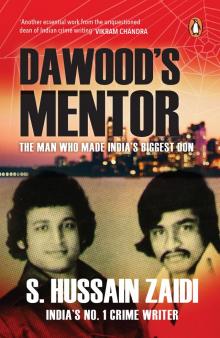 Dawood's Mentor
Dawood's Mentor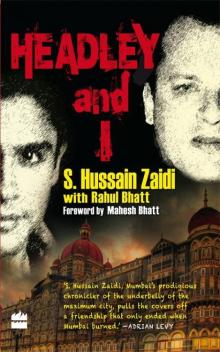 HEADLEY AND I
HEADLEY AND I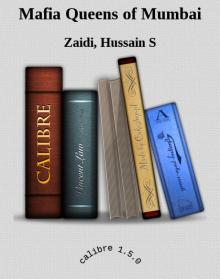 Mafia Queens of Mumbai
Mafia Queens of Mumbai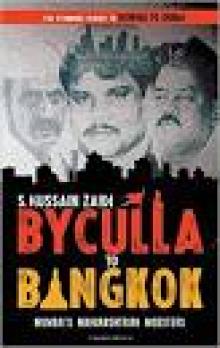 Byculla to Bangkok
Byculla to Bangkok Black Friday
Black Friday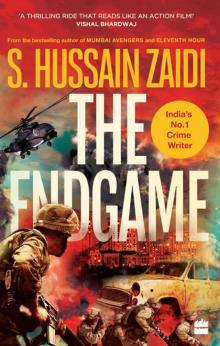 The Endgame
The Endgame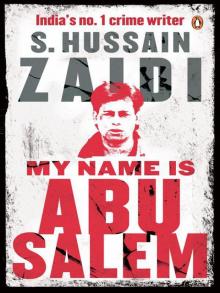 My Name is Abu Salem
My Name is Abu Salem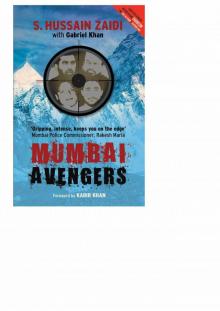 Mumbai Avengers
Mumbai Avengers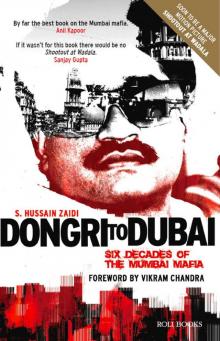 Dongri to Dubai - Six Decades of the Mumbai Mafia
Dongri to Dubai - Six Decades of the Mumbai Mafia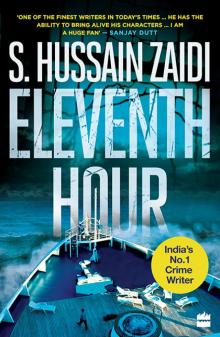 Eleventh Hour
Eleventh Hour